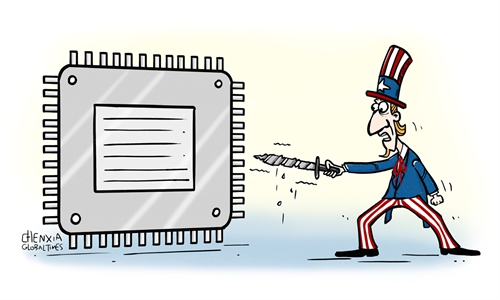
chip Photo:VCG
Authorities in Shanghai, the hub of China's semiconductors industry, on Wednesday said 14-nanometer chips are now being mass produced in the city.
The achievement is a milestone for Shanghai in building a modern technology center, and a major event for China's chips-making sector to break the blockade of the US government, amid the intensified China-US tech competition, experts said.
Shanghai-based firms have achieved mass production of semiconductors with 14-nm process and made breakthroughs in 90-nm lithography machines, 5-nm etching machines, 12-inch large silicon wafers, central processing units and 5G chips, Wu Jincheng, director of the Shanghai Municipal Commission of Economy and Digitalization, said at a press conference on Wednesday.
It marks the first official recognition of the ability of Chinese companies to mass produce 14-nm chips, Xiang Ligang, an independent technology analyst, told the Global Times on Wednesday.
The validation also comes as a powerful response to an expanded US blockade on high-end chip exports to China, which will only accelerate China's breakthroughs in core technology, experts said
"The broader the US blockades are, the faster that China will research and develop its own technology," Xiang said.
The Biden administration plans to broaden curbs on US shipments to China of semiconductors used for artificial intelligence and chip-making tools, Reuters reported on Monday.
The US Commerce Department has sent letters to companies including KLA Corp, Lam Research Corp and Applied Materials Inc, forbidding them from exporting chip-making equipment to Chinese factories that produce advanced semiconductors with sub-14-nm processes unless the sellers obtain Commerce Department licenses, according to the report.
While 10-nm has often been taken as a benchmark for advanced processes, for China, mature processes above 14-nm can meet the majority of Chinese market demands, Xiang said.
Chen Jia, an independent research fellow on strategy, told the Global Times on Wednesday that demand for 14-nm process in the industry is represented by new-energy vehicles.
The large-scale production of 14-nm chips in Shanghai will greatly help the development of such sectors as new-energy cars, smart cities, intelligent manufacturing and the Internet of Things, which will help China consolidate its advantage as the world's top manufacturing factory, Chen said.
Experts said that the 14-nam breakthrough shows that China will allocate resources for breakthroughs in more advanced manufacturing processes.
With the completion of Shanghai's industry cluster for the 14-nm chips, more advanced projects in the 7- and 5-nm processes will be accelerated, Chen said.
"The manufacturing of 7-nm chips in China is also progressing faster than expected," Xiang said.
Shanghai is the backbone of the nation's semiconductors industry, with a market size reaching 250 billion yuan ($35.91 billion) in 2021, accounting for 25 percent of the nation's total. More than 1,000 leading enterprises have settled in Shanghai, attracting 40 percent of the talent nationwide, officials said.
At the beginning this year, the Shanghai municipal government announced a set of new policies to bolster China's advanced chip-making capacity.



